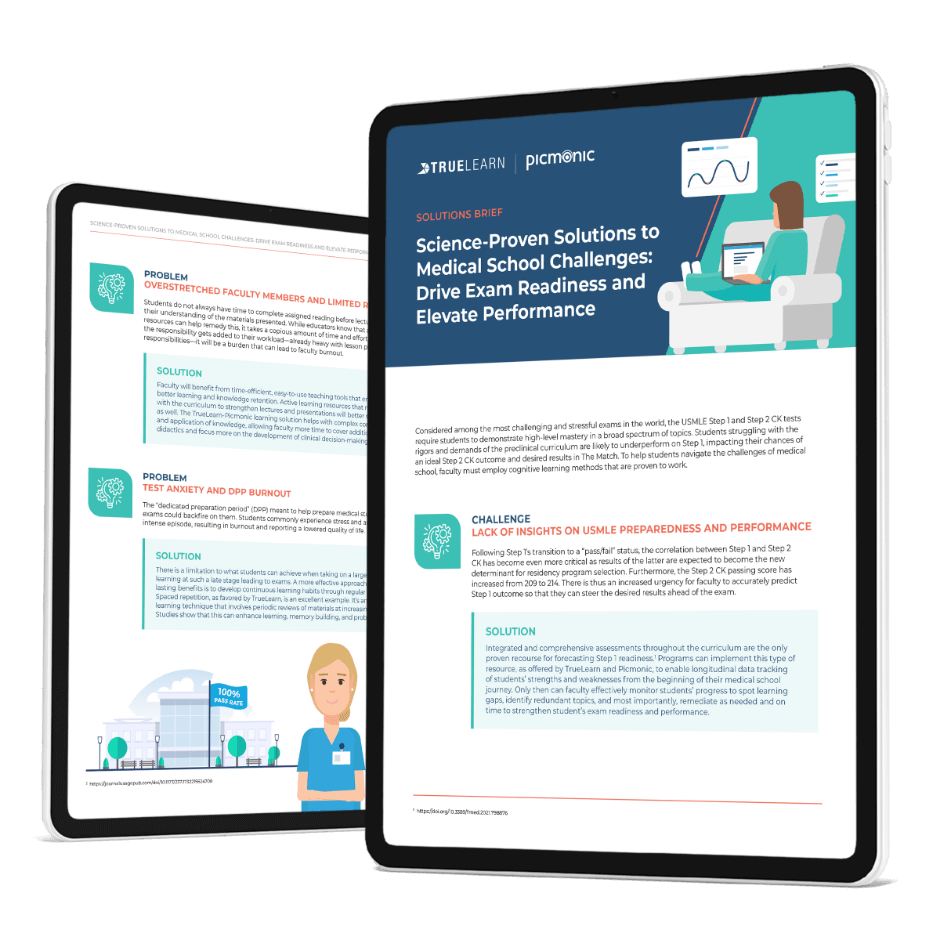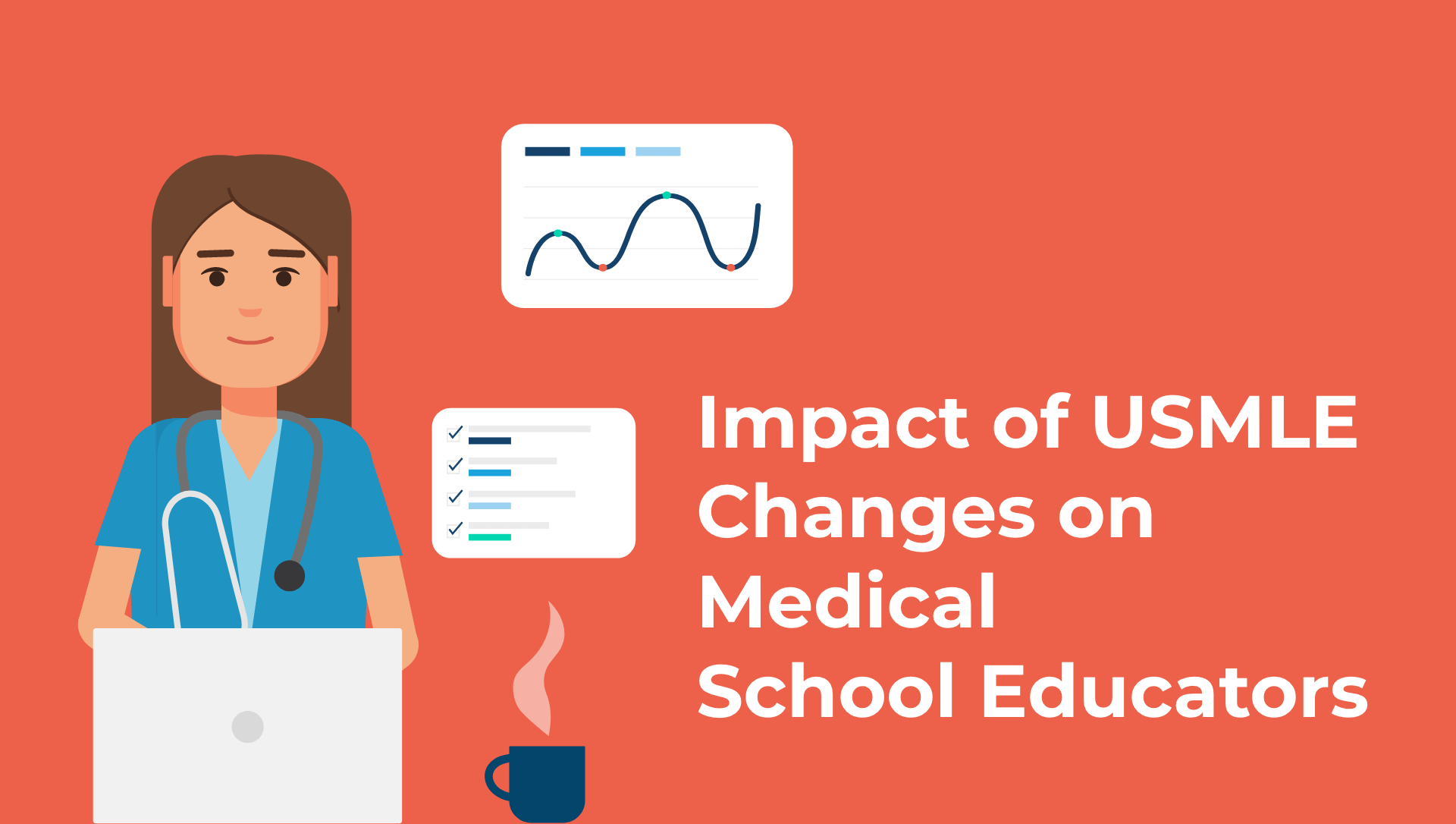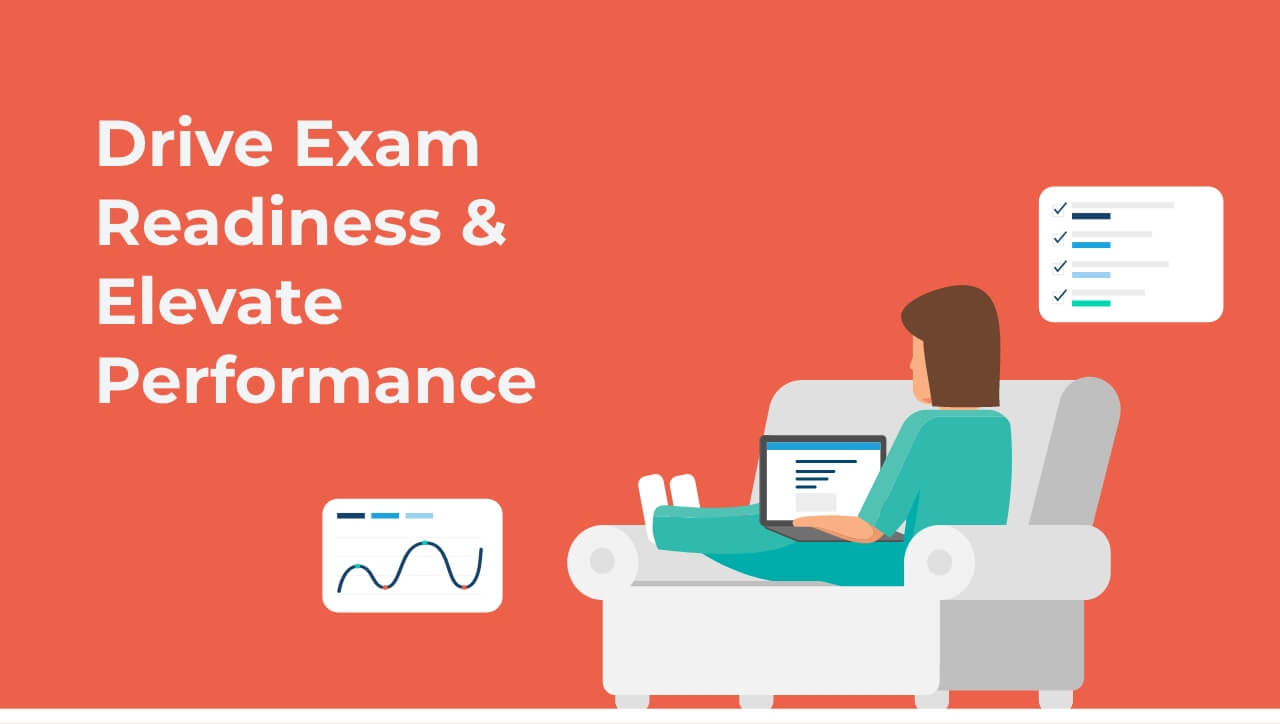Leveraging Evidence-Based Learning Strategies Can Improve USMLE® Outcomes
Programs looking to elevate learning and maximize USMLE® results know that they must equip faculty with the right resources that let them effectively deliver those objectives while overcoming key challenges.
The ideal tool should enable educators to easily integrate evidence-based learning strategies, like practice retrieval and spaced repetition, into the curriculum to support traditional lectures and classroom activities. It’s equally important that the tool provides access to critical performance data so educators can identify at-risk students quickly and early enough to implement curricular improvements and remediation promptly. That way, educators are equipped to improve students’ chances of outperforming on the USMLE® while helping programs regulate pass rate fluctuations.
Let’s explore four strategies that are research-proven to enhance learning and optimize exam outcomes.
Understanding 4 major evidence-based learning strategies
Evidence-based learning refers to educational practices and strategies that are grounded in scientific research and proven to enhance student outcomes. These four strategies enable educators to create more effective learning environments, thereby empowering students to learn and retain knowledge better and recall information with ease.
1. Practice retrieval—recall information with ease
In practice retrieval, students actively recall previously learned material through methods like flashcards and low-stakes quizzes. This approach has been found to enhance long-term memory retention, outperforming techniques like repeated study or concept mapping. Research also shows that practice retrieval promotes higher-order thinking and metacognitive skills, improving performance on complex tasks across various age groups and subject areas.
2. Spaced repetition—improve long-term knowledge retention
This method leverages the “spacing effect”, whereby the time intervals between reviews of material are gradually increased. This challenges the brain to retrieve information over extended periods, encouraging deeper processing in long-term memory compared to massed repetition and enhancing various forms of learning, including problem-solving and adaptability. Research has proven its effectiveness, with studies demonstrating improved performance in complex tasks—such as microsurgical skills—even a month after training.
3. Varied practice—enhance learning through diverse activities
Rather than merely memorizing specific answers or techniques, students can learn to apply their knowledge across various situations through varied practice, which involves engaging in different types of activities (rather than repeating the same activity multiple times). This requires students to process the same content through different problems or contexts, thereby enhancing encoding and improving learning outcomes
4. Interleaving—boost retention and critical thinking
Most students tend to focus on learning one topic at a time but science suggests that switching between related concepts—known as interleaving—encourages them to recognize patterns across different areas of knowledge, fostering a more holistic understanding. Interleaving requires students to actively engage with and apply information learned, rather than simply memorizing it. This way, students can more easily deepen comprehension and build mastery, which is essential for developing the critical thinking and clinical judgment skills required to perform well on licensure exams and in practice.
Educators can leverage these strategies to enhance learning but they also need access to performance data so they can identify at-risk students early and implement curricular improvements or remediation on time. The ideal resource is the integrated TrueLearn-Picmonic solution, which pairs evidence-based learning strategies with a robust data analytics engine to surface learning gaps and needs, informing faculty on ways to boost students’ chances of a first-time pass on the USMLE®.
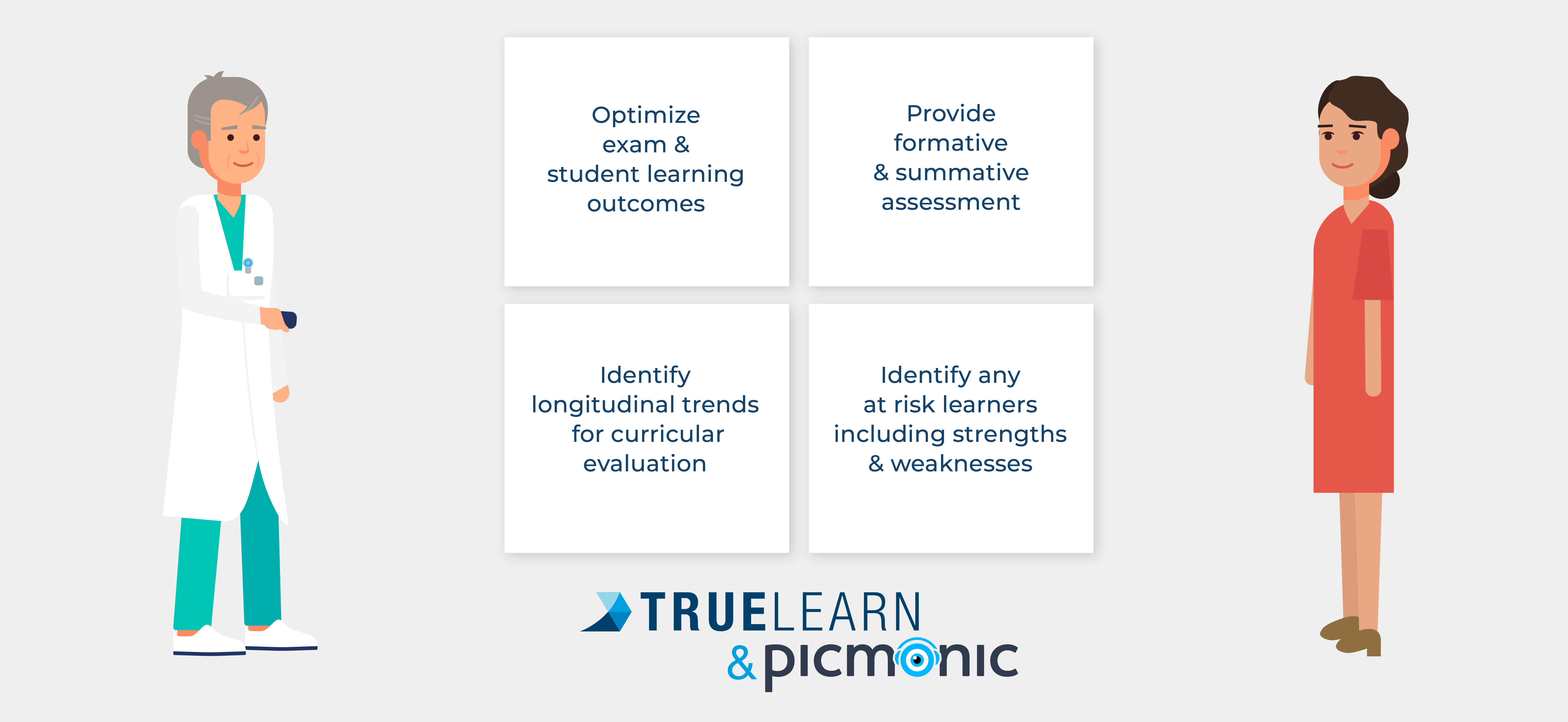
Why medical schools should integrate evidence-based learning strategies into the curriculum
The time commitment needed for item-writing and preparing classroom learning activities for students is significant. Medical school educators juggling teaching, committee service, scholarly work, clinical duties, and other professional and personal responsibilities may find little, if any, time to facilitate such activities.
TrueLearn’s solution provides programs with content that can be mapped to the existing curriculum equipping educators with ready-to-use resources that align with what they are teaching to activate evidence-based learning and also board prep, including formative and summative assessments to track progress and spot knowledge gaps.
Not only does this lighten educators’ workloads but it also reduces the need for students to choose between two competing priorities: attend class or use the time for exam prep. When faculty can optimize their academic hours, they are modeling to students how to embrace an integrated study approach that limits missed learning opportunities. Faculty can also spend less time on remediation. Additionally, when faculty drive exam prep through regular assessments and active learning experiences spaced throughout the curriculum, students develop continuous learning habits that are crucial to their future success.
How TrueLearn and Picmonic enhance long-term retention and knowledge building
TrueLearn and Picmonic were built on the principles of cognitive science and leverage the techniques discussed above to support precision learning and deliver engaged, active learning and simulated test-taking experiences.
Integrated into the curriculum, the TrueLearn-Picmonic solution lets educators elevate teaching and learning while enabling board prep for students, leading to optimal USMLE® readiness and outcomes. Download our Solution Brief below to learn how.
Educators can merge resources from both platforms to enhance their lesson planning and teaching materials, accelerating students’ understanding of important topics and complex concepts. Spaced repetition, for example, has been shown to be effective in helping learners improve retention and recall by reviewing materials at increasing time intervals. This helps circumvent what Hermann Ebbinghaus hypothesized as the “forgetting curve”, whereby memories will fade over time unless efforts are made to retain them before the curve dips. TrueLearn and Picmonic utilize adaptive algorithms and data analytics to forecast when that’s likely to happen and send timely reminders to review the relevant information. Educators can create quizzes and reading assignments centered around those materials to help students keep the curve up.
At the same time, faculty can track if students are learning effectively and not foregoing attention to curriculum for exam prep, or vice-versa. This is how programs can steer optimal academic excellence, enhance first-time pass rates on USMLE® exams, improve students’ chances of matching with their desired residency, and protect the institution’s reputation.
Gain meaningful insights from performance analytics and longitudinal data
The key and objective data surfaced through TrueLearn’s data analytics engine provides faculty with real-time performance feedback on students’ strengths and weaknesses. It also highlights learning and comprehension gaps so that at-risk students can be identified early, remediation can occur proactively, teaching can be more efficient, and optimal exam and medical school outcomes can be obtained.
TrueLearn also arms medical school leaders with longitudinal performance analytics and in-depth reporting capabilities to surface actionable insights on cohort progress as well as pinpoint curricular trends. With these insights, deans can effectively identify curricular gaps, set goals, and track improvement.
TrueLearn and Picmonic are trusted by medical schools nationwide to deliver a powerful, positive impact on student learning and exam outcomes. By leveraging evidence-based learning strategies, educators are empowered to guide students effectively and efficiently through the medical curriculum to prepare them for optimal performance on the USMLE® and NBME® exams.
References & Footnotes
1 Cranney, J., & McDonald, F. (2012). Evidence-based learning. In Encyclopedia of the Sciences of Learning (pp. 1185–1188). Springer US.
2 Carvalho, P. F., McLaughlin, E. A., & Koedinger, K. R. (2022). Varied practice testing is associated with better learning outcomes in self-regulated online learning. Journal of Educational Psychology, 114(8), 1723–1742. https://doi.org/10.1037/edu0000754
3 Kang SHK. Spaced repetition promotes efficient and effective learning. Policy Insights From the Behavioral and Brain Sciences. 2016;3(1):12-19.doi:10.1177/2372732215624708
*The USMLE® and National Board of Medical Examiners® (NBME®) subject exams are trademarks of the National Board of Medical Examiners. This content is not endorsed or approved by NBME.
